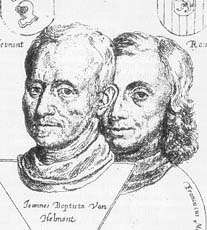Franciscus Mercurius van Helmont
| Franciscus Mercurius van Helmont | |
|---|---|

Franciscus Mercurius (right) with his father Jan Baptist van Helmont from the Ortus medicinae (1648)
|
|
| Born | baptised on 20 October 1614 Vilvoorde, Flemish Brabant |
| Died | December 1698 or 1699 Cölln, Holy Roman Empire |
| Fields | Chemistry |
Franciscus Mercurius van Helmont (baptised 20 October 1614 – 1698 or 1699) was a Flemish alchemist and writer, the son of Jan Baptist van Helmont. He is now best known for his publication in the 1640s of his father's pioneer works on chemistry, which link the origins of the science to the study of alchemy.
From his early work as a physician, he became a kabbalist, and also with Henry More of the Cambridge Platonists. Together they annotated Christian Knorr von Rosenroth's translations of kabbalist texts.
He led an itinerant life in wanderings in Europe, an adjective already applied to him by Anthony Ashley-Cooper, 3rd Earl of Shaftesbury in his 1711 Characteristics of Men, Manners, Opinions, Times. He self-identified as a "wandering eremite".
Franciscus van Helmont had important groups of contacts in the Netherlands, where he knew Adam Boreel and Serrarius, and later in life, in 'the Lantern', the circle around the Rotterdam merchant Benjamin Furly that included John Locke. He was an influence on Franciscus van den Enden, and on the Spanish medical professor Juan de Cabriada. In Amsterdam around 1690 he worked out theory to support the work Johann Konrad Ammann was doing with deaf people.
He also spent much time in Germany and England. From 1644, when his father died, to 1658, when Leopold I, Holy Roman Emperor ennobled him, he was constantly involved in diplomacy for German princes and their families.
In 1661 he was in Kitzingen when he was forcibly taken by soldiers of Philipp Wilhelm, Elector Palatine to Rome and a prison of the Inquisition, where he was tortured and kept for 18 months.
...
Wikipedia
